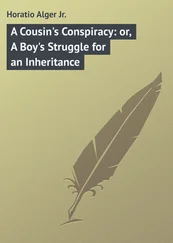Horatio Alger - From Canal Boy to President; Or, the Boyhood and Manhood of James A. Garfield
Здесь есть возможность читать онлайн «Horatio Alger - From Canal Boy to President; Or, the Boyhood and Manhood of James A. Garfield» — ознакомительный отрывок электронной книги совершенно бесплатно, а после прочтения отрывка купить полную версию. В некоторых случаях можно слушать аудио, скачать через торрент в формате fb2 и присутствует краткое содержание. Жанр: foreign_children, literature_19, foreign_antique, foreign_prose, Биографии и Мемуары, на английском языке. Описание произведения, (предисловие) а так же отзывы посетителей доступны на портале библиотеки ЛибКат.
- Название:From Canal Boy to President; Or, the Boyhood and Manhood of James A. Garfield
- Автор:
- Жанр:
- Год:неизвестен
- ISBN:нет данных
- Рейтинг книги:5 / 5. Голосов: 1
-
Избранное:Добавить в избранное
- Отзывы:
-
Ваша оценка:
- 100
- 1
- 2
- 3
- 4
- 5
From Canal Boy to President; Or, the Boyhood and Manhood of James A. Garfield: краткое содержание, описание и аннотация
Предлагаем к чтению аннотацию, описание, краткое содержание или предисловие (зависит от того, что написал сам автор книги «From Canal Boy to President; Or, the Boyhood and Manhood of James A. Garfield»). Если вы не нашли необходимую информацию о книге — напишите в комментариях, мы постараемся отыскать её.
From Canal Boy to President; Or, the Boyhood and Manhood of James A. Garfield — читать онлайн ознакомительный отрывок
Ниже представлен текст книги, разбитый по страницам. Система сохранения места последней прочитанной страницы, позволяет с удобством читать онлайн бесплатно книгу «From Canal Boy to President; Or, the Boyhood and Manhood of James A. Garfield», без необходимости каждый раз заново искать на чём Вы остановились. Поставьте закладку, и сможете в любой момент перейти на страницу, на которой закончили чтение.
Интервал:
Закладка:
About this time he received a letter from his brother.
"Dear James," he wrote, "I shall be glad to hear how you are getting along. You took so little money with you that you may need more. If so, let me know, and I will try to send you some."
James answered promptly: "Don't feel anxious about me, Thomas. I have been fortunate enough to secure work at a carpenter's-shop, and my expenses of living are very small. I intend not to call upon you or mother again, but to pay my own way, if I keep my health."
He kept his word, and from that time did not find it necessary to call either upon his mother or his good brother, who was prepared to make personal sacrifices, as he had been doing all his life, that his younger brother might enjoy advantages which he had to do without.
At length the summer vacation came. James had worked hard and won high rank in his respective studies. He had a robust frame, and he seemed never to get tired. No doubt he took especial interest in composition and the exercises of the debating society which flourished at Geauga, as at most seminaries of advanced education. In after-life he was so ready and powerful in debate, that we can readily understand that he must have begun early to try his powers. Many a trained speaker has first come to a consciousness of his strength in a lyceum of boys, pitted against some school-fellow of equal attainments. No doubt many crude and some ludicrous speeches are made by boys in their teens, but at least they learn to think on their feet, and acquire the ability to stand the gaze of an audience without discomposure. A certain easy facility of expression also is gained, which enables them to acquit themselves creditably on a more important stage.
James early learned that the best preparation for a good speech is a thorough familiarity with the subject, and in his after-life he always carefully prepared himself, so that he was a forcible debater, whom it was not easy to meet and conquer.
"He once told me how he prepared his speeches," said Representative Williams, of Wisconsin, since his death. "First he filled himself with the subject, massing all the facts and principles involved, so far as he could; then he took pen and paper and wrote down the salient points in what he regarded their logical order. Then he scanned these critically, and fixed them in his memory. 'And then,' said he, 'I leave the paper in my room and trust to the emergency.'"
When the vacation came James began to look about for work. He could not afford to be idle. Moreover, he hoped to be able to earn enough that he might not go back empty-handed in the fall.
Generally work comes to him who earnestly seeks it, and James heard of a man who wanted some wood cut.
He waited upon this man and questioned him about it.
"Yes," he answered, "I want the wood cut. What will you charge to do it?"
"How much is there?"
"About a hundred cords."
James thought of the time when he cut twenty-five cords for seven dollars, and he named a price to correspond.
"I'll give you twenty-five dollars," said the proprietor of the wood.
It was a low price for the labor involved, but, on the other hand, it would be of essential service to the struggling student.
"I will undertake it," he said.
"When will you go to work?"
"Now!" answered James promptly.
How long it took him to do the work we have no record, but he doubtless worked steadfastly till it was accomplished. We can imagine the satisfaction he felt when the money was put into his hands, and he felt that he would not need to be quite so economical in the coming term.
Accordingly, when the vacation was over and James went back to the seminary, he did not re-engage the room which he and his two friends had rented the term before. He realized that to be in a condition to study well he must feed his body well, and he was in favor of a more generous system of diet. Besides, the labor required for cooking was so much time taken from his study hours.
He heard that a widow—Mrs. Stiles—mother of the present sheriff of Ashtabula County, was prepared to receive boarders, and, accordingly, he called upon her to ascertain if she would receive him.
She knew something of him already, for she learned that he had obtained the reputation of a steady and orderly student, and was disposed to favor his application.
The next question was an important one to young Garfield.
"How much do you expect me to pay?"
He waited with some anxiety for the answer, for though he had twenty-five dollars in his pocket, the term was a long one, and tuition was to be paid also.
"A dollar and six cents will be about right," said Mrs. Stiles, "for board, washing, and lodging."
"That will be satisfactory," said James, with a sigh of relief, for he saw his way clear to pay this sum for a time, at least, and for the whole term if he could again procure employment at his old trade.
A dollar and six cents! It was rather an odd sum, and we should consider it nowadays as very low for any sort of board in any village, however obscure or humble. But in those days it was not so exceptional, and provisions were so much lower that the widow probably lost nothing by her boarder, though she certainly could not have made much.
James had no money to spare for another purpose, though there was need enough of it. He needed some new clothes badly. He had neither underclothing nor overcoat, and but one outside suit, of cheap Kentucky jean. No doubt he was subjected to mortification on account of his slender supply of clothing. At any rate he was once placed in embarrassing circumstances.
Toward the close of the term, as Mrs. Stiles says, his trowsers became exceedingly thin at the knees, and one unlucky day, when he was incautiously bending forward, they tore half-way round the leg, exposing his bare knee.
James was very much mortified, and repaired damages as well as he could with a pin.
"I need a new suit of clothes badly," he said in the evening, "but I can't afford to buy one. See how I have torn my trowsers."
"Oh, that is easy enough to mend," said Mrs. Stiles, cheerfully.
"But I have no other pair to wear while they are being mended," said James, with a blush.
"Then you must go to bed early, and send them down by one of the boys. I will darn the hole so that you will never know it. You won't mind such trifles when you become President."
It was a jocose remark, and the good lady little dreamed that, in after years, the young man with but one pair of pantaloons, and those more than half worn, would occupy the proud position she referred to.
Chapter X—A Cousin's Reminiscences
During his school-life at Geauga Seminary James enjoyed the companionship of a cousin, Henry B. Boynton, who still lives on the farm adjoining the one on which our hero was born. The relationship between the two boys was much closer than is common between cousins; for while their mothers were sisters, their fathers were half-brothers. Henry was two years older than James, and they were more like brothers than cousins. I am sure my young readers will be glad to read what Henry has to say of their joint school-life. I quote from the account of an interview held with a correspondent of the Boston Herald , bearing the date of September 23, 1881:
When General Garfield was nominated to the Presidency his old neighbors in Orange erected a flag-staff where the house stood which Garfield and his brother erected for their mother and sisters with their own hands, after the log hut, a little farther out in the field nearer the wood, had become unfit for habitation. Thomas Garfield, the uncle of the President, who not long since was killed by a railroad accident, directed the manual labor of rearing the shaft, and was proud of his work.
Читать дальшеИнтервал:
Закладка:
Похожие книги на «From Canal Boy to President; Or, the Boyhood and Manhood of James A. Garfield»
Представляем Вашему вниманию похожие книги на «From Canal Boy to President; Or, the Boyhood and Manhood of James A. Garfield» списком для выбора. Мы отобрали схожую по названию и смыслу литературу в надежде предоставить читателям больше вариантов отыскать новые, интересные, ещё непрочитанные произведения.
Обсуждение, отзывы о книге «From Canal Boy to President; Or, the Boyhood and Manhood of James A. Garfield» и просто собственные мнения читателей. Оставьте ваши комментарии, напишите, что Вы думаете о произведении, его смысле или главных героях. Укажите что конкретно понравилось, а что нет, и почему Вы так считаете.












